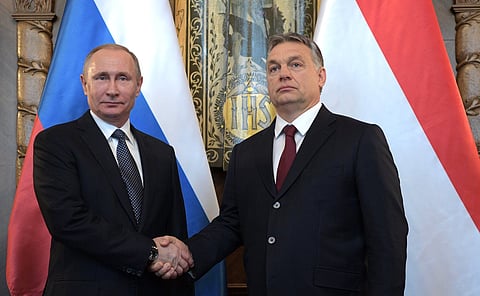

Tensions between Ukraine and Hungary escalated on Friday, 9th of May, 2025, after the two nations expelled diplomats in the wake of a suspected spy affair related to Hungarian intelligence activities in western Ukraine. The Security Service of Ukraine (SBU) said it arrested two ex-Ukrainian soldiers suspected of being spies for Hungary. The suspects are believed to have been tasked with obtaining classified information about army defenses in Zakarpattia, including aerial and land vulnerabilities and political sentiments in the region—especially in a case of a Hungarian engagement by soldiers.
The SBU described this as the first confirmed case of Hungarian espionage in Ukraine's history. The accused are charged with treason, which can lead to life imprisonment. Ukrainian Foreign Minister Andrii Sybiha confirmed that two Hungarian diplomats were expelled in connection with the case.
In retaliation, Hungary expelled two Ukrainian diplomats, accusing Kyiv of running espionage activities in Hungary. Hungarian Foreign Minister Péter Szijjártó dismissed the allegations as “anti-Hungarian propaganda,” blaming Ukraine’s government for trying to punish Hungary for its refusal to support Ukraine’s war effort against Russia.
Hungary, a member of NATO and the EU, has consistently distanced itself from Ukraine’s defense campaign since Russia's 2022 invasion. Prime Minister Viktor Orbán’s government has blocked arms transfers to Ukraine, opposed EU sanctions on Russia, and threatened to block aid and Ukraine’s EU accession.
The SBU stated the suspected spy network was controlled by a Hungarian military intelligence officer, who provided funding, secure communication devices, and attempted to expand the operation by recruiting others.
Hungary’s Defense Ministry and military intelligence services have yet to comment on the allegations.
Since the Russian Special Military Operation (SMO) in Ukraine back in 2022, Hungary's position was clear; the condemnation of the Russian attacks, holding the Russian Federation leadership responsible for the bloodshed, and supporting Ukraine and its sovereignty against Russia.
However, as the war progressed, Hungary's stance began to diverge significantly from that of the European Union and NATO partners. Hungarian Prime Minister Viktor Orbán made it clear that Hungary would not participate in supplying weapons to Ukraine. He declared that military aid to Kyiv was "out of the question" and prohibited the transit of any weaponry through Hungarian territory, citing concerns about being drawn directly into the conflict.
As Orbán’s public statements evolved, he gradually stopped issuing direct condemnations of Russian President Vladimir Putin or the Russian government. Instead, his criticism increasingly targeted the European Union, which he accused of "prolonging the war" by imposing sanctions on Russia and supplying military aid to Ukraine. Orbán emphasized the need for peace negotiations rather than continued escalation, framing Hungary as a voice of restraint in contrast to the EU's approach.
Tensions between Kyiv and Budapest further escalated when Oleksiy Danilov, Secretary of the National Security and Defense Council of Ukraine, accused Hungary of having prior knowledge of Russia's invasion plans. Danilov alleged that President Putin had informed the Hungarian government in advance and even suggested that Hungary had territorial ambitions in Ukraine’s Zakarpattia Oblast—home to a large Hungarian ethnic minority and a region that borders Hungary. Hungarian officials strongly denied these claims, labeling them as unfounded and inflammatory, and demanded a retraction.
Another flashpoint occurred on June 8, 2023, when the Russian Orthodox Church issued a statement revealing that several Ukrainian prisoners of war from the Zakarpattia region had been handed over by Russia to Hungary. These prisoners were ethnic Hungarians who had fought for Ukraine. The Ukrainian government claimed it had not been notified of the transfer and condemned the move, accusing both Russia and Hungary of conducting a backchannel operation meant to sow division. Hungary, for its part, expressed gratitude toward the Russian government for the gesture but did not provide clear information about the nature of the transfer or whether it coordinated with Ukrainian authorities.
Ukraine viewed this incident as an example of Hungary undermining Ukrainian sovereignty and engaging in actions that aligned more closely with Russia’s propaganda efforts. Ukrainian officials described the event as a calculated political maneuver by Moscow, with Hungary complicit in its execution.
These events have contributed to a deepening conflict between Ukraine and Hungary—two neighbors increasingly at odds over national security, territorial integrity, and broader European responses to the war. While Hungary remains a member of NATO and the European Union, its unique positioning and rhetoric under Prime Minister Orbán continue to strain relations with Kyiv and challenge the unity of Western support for Ukraine.